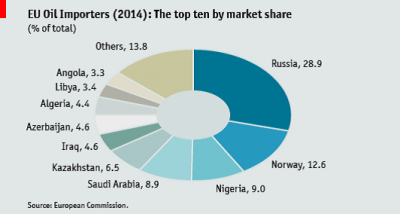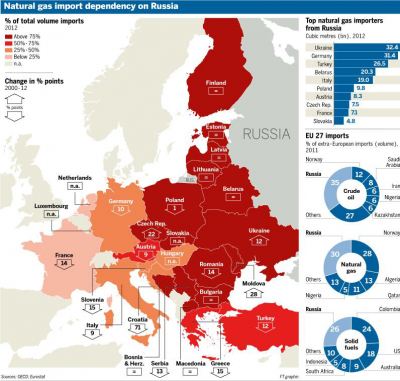By
Anant Mishra
Introduction
The much talked of European Energy policy–or “European Energy Union” was always in the minds of heads of European Union member states. But due to their lack of lack of political will, the idea did not proceed. That has now changed and “once deliberately discussed in EU parliament” is heading to become a policy.
Since the beginning of the revolution at Euromaidan, the popular civil unrest in Ukraine and successful accession of Crimea by the Russian Federation on 18 March 2014, EU leaders became concerned over energy security. Without a doubt, Europe is the world’s leading energy producer, with a financial estimation of £1 billion every day and an estimated energy consumption of 54%. Russia’s aggression changed the energy posture in the EU, forcing the leaders to sit on an issue that remained ignored. Gazprom, a Russia backed global energy agency, which uses its price negotiation tool as an effective instrument for Russia’s foreign policy, has once again made EU leaders wary about the dependence of energy on “unstable and aggressive” Russia.
The proposal to create an Energy Union was first introduced in 2006 in an effort to end Russia’s dominance in the energy sector, now this idea has fixated a lot of European Union officials and diplomats of member states. The idea of a European energy policy failed to attract suitable votes, but with Moscow’s aggressive movements, EU leaders once again brought this agenda to the table, beginning a series of Energy talks in Europe.
History
In early 2006, “energy security” was one of the most important agendas for European leaders. However, a series of events throughout the 2000s increased awareness not just in the EU, but throughout the world. These events can be segmented into three parts. First, developing economies began inviting new business ventures and their need for energy increased immensely. Chinese agencies began using rare resources which further increased competition between companies. Second, the world was struck with major natural disasters which affected not only the resources but also the market. One such example is the storm which struck in the ?talo-Suisse border which greatly disrupted electricity supply in the region and caused massive black outs in 2003. Also, Hurricane Katrina in the Western Atlantic heavily affected the supply of electricity, oil and gas. Moreover, geopolitical tensions and terror strikes threatened the energy markets. Third, nations began using energy as a bargaining chip. From a necessary resource, energy was turned into an essential tool in foreign policy. Geopolitically, the use of oil as a foreign policy tool took us back to the 1973 oil crisis.
But the recent use of energy as an aggressive bargaining tool by Russia and its energy giant Gazprom concerns most of the EU. The mid-2000s commercial dispute between Russia and Belarus resulted in Gazprom cutting the energy supply. Another example of conflict was the armed struggle between Ukraine and Russia where Gazprom stopped the energy supply in 2006. This crisis did not only affect Ukraine; it affected the whole of Europe, as Ukraine was a transit route to Russia’s gas exports. Reasons pertaining to such mentioned challenges, EU policy makers made numerous efforts to create a concrete EU energy policy.
Previous policies of the EU
Energy Community
Although the European Union energy market comprises the whole of Europe, but is unable to meet the growing demands of energy, policy makers wanted to expand this Union by inviting non-EU members. Prioritising the energy crisis, political leaders of the EU focussed on identifying viable solutions, irrespective of the political crisis of the 1990s (the conflicts and civil war in Yugoslavia), policy makers of the DG TREN (Directorate-General for Mobility and Transport) discussed to create a South East Europe Regional Energy Market (SEEREM). It later became popular as the “Athens Memorandum”. It comprised the memorandum of understanding of 2002 and after revising it in 2003, EU nations signed the memorandum in Athens. It was proposed by the EU to establish an integrated regional electricity market. The Athens Memorandum comprised numerous working groups, which later became popular as “Athens Process”. After a unanimous discussion by political leaders of the EU, the Athens Forum decided to change its name to the “Energy Community”.
The legal process for the change of name began in early May 2004. EU and other signatories to the Athens Memorandum began negotiating the terms of the Energy Community. After successfully establishing the Treaty of Athens on October 25th, 2005, it gained its full working capability on July 1st, 2006.
The primary objective of this community was to extend the rules of the European Union energy market by inviting nations from South East Europe and regions in and around the Black Sea. It was further tasked to establish a market to invite tempting investors in the sector of power generation, create an integrated Energy market for the EU and enhance the security for the energy market which was crucial for the economic and political stability within the EU, and to ensure the balance of energy and environment by encouraging the use of renewable energy and energy efficiency.
The Third Package
One of the most important pieces of legislation in energy was the Third Package. Its aim was to liberate the EU gas market but the process was very slow. The primary objective of this package was to create a single European gas and electricity market which would help keep the prices low while increasing the standards of the services and security of supply.
This package comprised of two directives, one which created common rules for internal market in gas and electricity while other directive focussed on regulation. Moreover, the national energy regulators along with the advisory group (European Regulator Group for Electricity and Gas (ERGEG)) proved consistently inefficient in maintaining energy regulation. EU leaders then unanimously decided to create a group which would provide useful guidance on technical issues. ACER then replaced ERGEG.
2006 Energy Security Union
Before the 2015 discussion of the “Energy Union” proposal, Poland, an active EU member, came up with a plan to create an “Energy Security Union” which was deliberately discussed in the European Commission. In 2006, Poland came up with the idea of “Energy NATO,” seeking assistance from the U.S. and EU in ensuring security for the Energy gas supplies. However, the idea received heavy criticism and later failed to deliver productive results. This idea failed because of four reasons.
- The proposal submitted by Poland advised the EU to be involved in a dialogue at an intergovernmental level. It was a burden on many of the EU member nations especially those who enjoyed a relationship with Russia and those who heavily depended on Russia for oil and gas, and if let’s say, would have accepted this proposal, would instigate a strain in the EU-Russia relationship which means, in the shorter run Europe would have suffered massive energy shortages.
- During negotiations, Poland lacked the necessary experience to carry out a discussion of such levels. Poland did not show much interest in interacting with regional agencies with the EU structures. Moreover, when Poland discussed resolution, the EC was already working on a green solution, which may have instigated a larger concrete discussion on the EU energy crisis. After actively advocating and lobbying their interests through environmentalists, Poland used an interest driven approach, rather than engaging in a “benefit for all” discussion. The Commission would largely have accepted their proposal if Poland would have worked on a non interest working for their own.
- The proposal included some heavy military tones and, in an effort to internationalise their proposal, Poland actively advocated against Russia, fuelling EU’s anti-Russian sentiments. Moreover, opening the grounds for transatlantic, Poland was keen on inviting the US and sought their assistance in building a much more concrete plan. However, the US agreed to most of the proposal, France on the contrary had its own concerns on Washington’s interference, such as energy deals with the EU with an aim to expand the American market. Most importantly, the European Commission was quiet against involving nations outside the EU, in the European energy policy.
- Poland wanted to open the energy union to other nations in an effort to attract private entities. Those nations which would benefit most from such entities then advocated for free and easy travel within the EU. This kind of discussion did not happen until 2006, besides some of the treaties within the EU countries such as the Schengen system of passport and free travel in the EU. Poland was quite focussed on everything else besides security of energy. It would have compromised most of the member nations, especially the power ones, and further risk compromising the level of commitment and cooperation within the member nations.
The Strategic Energy Technology Plan
The European Union Strategic Energy Technology Plan, was adopted by the EU in 2008, which aimed to enhance cooperation and coordination of research agencies Europe in effectively bringing it in the front of low carbon technologies in the market. It was an initiation of the EU to establish an energy technology policy. It comprised of seven main initiatives:
- European Wind Initiative
-
Solar Europe Initiative
-
Bioenergy Europe Initiative
-
European CO2 capture
-
Transport and storage initiative
-
European electricity grid initiative
-
Sustainable nuclear fission initiative
To this day, the European Energy Research Alliance (EERA) has been effectively working with national and regional research organizations to achieve the targets of SET-Plan, and to establish a joint research program within the EU framework. The estimated budget of this SET-Plan is €71.5 billion. However, despite rigorous efforts, member nations haven’t been able to achieve levels of gas emission and pollution rates as it was supposed to. Furthermore, the SET-Plan has created a framework through which it plans to achieve “development and deployment of cost-effective low carbon technologies” by 2020.
Growing need of Energy Union
It’s not the first time the EU has been involved in a discussion on energy. One of the predecessors of the European Union was European Coal and Steel Community. If you are travelling to Europe, you may find foreign commodities in EU member nations, or visit banks of EU nations in non-EU member nations. This is the level of integration we see in Europe in everything else besides energy. In 2000 alone, the EU imported over 47% of its energy products; almost sixteen years later, Europe has become heavily dependent upon external energy sources, spending over €587 billion.
To understand this more extensively, the EU’s energy trade deficit phenomenally increased by 180% between 2004 and 2012 crossing over €421 billion. Facts such as these have made EU the largest exporter of energy and vulnerable. Russia’s aggression over Crimea has resulted in strenuous relations between Brussels and Moscow. Following the aggression, the European Union imposed economic sanctions on Russia, whereas Moscow withdrew from many agreements treaties. This strain has not only affected Europe, but the relationship between the Energy suppliers, stakeholders and private entities, and energy buyers have been adversely affected. For European leaders, Putin’s hand on the valve of energy and gas is another act of aggression. Europe will be looking to another massive blackout, in another six months’ time, if Russia switches the valve.
With depleting uranium energy, the research on nuclear energy is in its infancy. The European Union is left with two options: either go with renewable energy or ask for more gas. Moreover, some of the countries such as Spain and Portugal, which does not depend Russia for gas and energy, disagreements with Russia will force these neutral countries to join the discussion, which they have no literal benefits of. This not only questions the integration of the European Union but also diminishes its power at the negotiation table. This is not the only reason for an energy union.
The European Union have been committed to combat environmental issues since the dissolution of the Soviet Union. In previous years, European leaders have been working to create a green EU and promote environmental friendly technologies. EU nations signed the Kyoto Protocol on 11th December 1997. However, with respect to air pollution, the EU nations are lagging massively behind.
The rapidly decreasing renewable resources make it another important reason for the EU to have their own energy union. Europe has limited resources, which are now being exhausted. As Europe is the largest importer of energy, EU leaders have to finally make a choice. They have the option to increase the amount of energy import. Today, ten EU nations are building reactors, while many are seriously giving a thought to building one. Nations such as, Finland, Slovakia, UK, and Poland which are few of the biggest nations in Europe are building plants, whereas member nation such as Hungary, Romania, Czech Republic, Bulgaria and Lithuania are in the process of building one. Moreover, member nations also have to ensure that rapidly decreasing uranium reserves and its production may result into another Fukushima. Hence the only possible solution for member nations in the EU is renewable energy. Today, EU nations are the largest producer of renewable resources. The quantity of the European Union production of renewable resources has jumped to 84.4%. The renewable energy business has given an employment of over €129bn and currently employs a million Europeans. Thus, investing in renewable energy will prove quite fruitful for EU in the longer run and thus, EU will be able to use a sustainable and an affordable energy.
Conclusion
The Energy Union is the most important initiative for the EU, which has the ability to change the EU and the entire world. It is important for policy makers and political leaders to identify viable and concrete solutions for the Energy Union. The Energy Union has the ability to achieve energy independence and if reinforced with policies, will be able to provide necessary security while leaving a sustainable and bright future for the next generation of Europe. Thus, member nations of the EU must create a viable action plan while considering all the parameters of this project.
Anant Mishra
Anant Mishra is a security analyst with expertise in counter-insurgency and counter-terror operations.






No Comments Yet!
You can be first to comment this post!